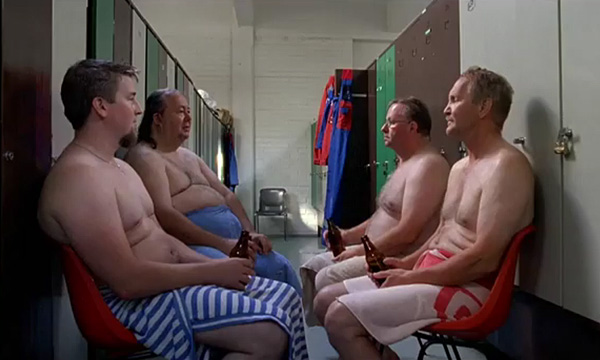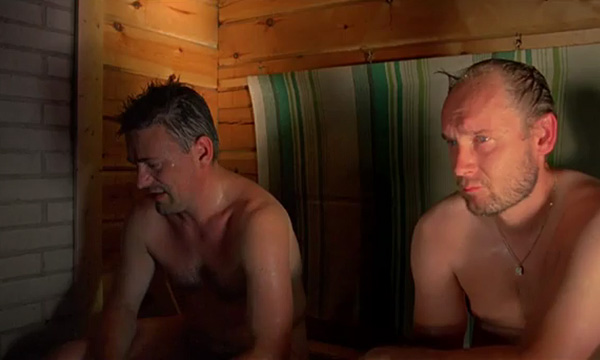In sauna veritas.
Once I read on some bulletin board that Finnish people never in their lives resort to small talk. Not even to fill social gaps or to conceal boredom. They’d rather be silent for a long time than chat idly. Since the person making this statement was a Finnish girl and since I had in mind models of eloquence of the caliber of Kati Outinen or Matti Pellonpää, I assumed she was telling the truth.
Today I was shocked to realize Finnish people can actually find pleasure in small talk like anybody else on Earth. My brain’s first reaction while watching the opening scenes of Steam of Life was, “These people are chatting idly! No way! They’re not Finnish!”. Then I came to realize they were not exactly “small talking”. They were chatting alright, but their talk was not necessarily “small”. My next reaction was, “How much of this documentary is actually true and how much previously scripted and arranged?”, because I was honestly impressed. Some of the things in the documentary were a little too extreme for me to get, like the song performed by all characters during the ending sequence. But my overall impression was positive and I know it’s corny to say, but after the film I felt er, lighter.



For most, Steam of Life will be the ultimate evidence Finnish people are completely bonkers. Look at them: they do love their saunas – and their beers – a little too much to be considered perfectly sane. But looking more carefully, the impression you get is they do love the sauna because the sauna represents in their lives the ultimate border of safety, the only place where manhood can still share something uniquely sincere, being it piety or sympathy or selflessness, whereas the rest of the world in normal conditions seems to be going in the opposite direction. The sauna is like an alternate universe where everybody is free to express true feelings and sometimes even not very flattering experiences. Men in saunas are fragile beings exposing themselves to other fragile beings, sometimes just looking for a friendly audience, sometimes for an exchange of opinions. Mutual understanding is easier when you feel protected. Finland has always been a huge and cold country; the sauna is like the perfect shelter, an ideal maternal womb where everybody is equal to his fellow and none of the superstructures of society has any power over individuals.
Some of the stories in Steam of Life are frankly heartbreaking, some are heartwarming, some are simply funny. Stories of families falling apart, stories of men rejecting civilization, stories of friendship in the most extreme situations. All the testimonies are so powerful that even the cynical who has given up on humanity will at some point be tempted to accept human values again. Finland appears to be a country with many social issues to be solved. The sons of Finland are represented as very humble persons unable to hide the unbearable sadness of life. They show themselves as reserved persons that don’t like to give away details of their existences as freely as other people do, perhaps. But when they do talk about themselves, they do it with a dignity that is simply overwhelming. The dejected and the lonely, the bachelors and the fathers, the sinners and the saints, all gather in the sauna to share their experiences, as the sauna is the alternate universe where one is free of being himself, of being frail and afraid, even free to admit defeat. The lesson of the film seems to be: despite what one may think, universal brotherhood is still possible, at least in the intimate protection of the vapors of the sauna.
I have a question though: where are the women?
Steam of Life will be in competition at the Academy Awards in the Best Foreign Language Film category.
Title: Miesten Vuoro (Steam of Life)
Year: 2010
Director: Joonas Berghäll and Mika Hotakainen
Genre: Documentary
Country: Finland
Runtime: 81 minutes
Language: Finnish
To answer your question:
In Finnish this movie is called Miesten vuoro which translates to “Men’s Turn” and this movie is about Finnish men and dedicated to them. (Like it was stated in the end of the movie.)
Most of the time Finnish men are considered rock hard and unfragile, but this movie was created to show that those men have also feelings, extremely deep ones that they just keep to themselves until the right moment.
Finnish women are “allowed” to complain and share their feelings anytime, now it’s Men’s Turn.
I know the film is dedicated to Finnish men, in fact it’s clearly stated at the end of the film itself. I was just wondering why such an “unusual” dedication, especially considering the film opens with the old couple’s story. But what you said about men’s fragility makes sense, so thank you for the comment!
hi pu… i liked your commentary on the film “steam of like” or “men’s turn” and i’m watching it this friday in caracas, venenzuela… yes, the caribbean soooo far a way from finland and it’s saunas. but, i wonder aren’t icelandic men in their thermal pools similar to finnish ones? in the terms of going inward? just wondering from the tropics 😉 in a cultural environment where as south americans we let “it all hang out”… thanks, janine
ps: i miss skyr and everything about your beautiful country…
ooops sorry about the typos “steam of life” and venezuela… it’s late. jjjj
Hey Janine,
it’s true that saunas are saunas everywhere, but Finnish people are especially serious about them! Icelandic sauna-goers don’t even come close to that, I’m afraid =D I think maybe Icelanders are more into swimming pools than into saunas. If you’ve been in Iceland, you know there are so so many swimming pools here =)
Thanks for stopping by and have a nice day!
yes, definitely… i was there 5 years ago and loved the pools, (i’m trying to go back to complete a course in CranioSacral Therapy precisely in one of the pools and then in the Blue Lagoon), but of course, they are co-ed and open, not womb-like as the saunas. so it’s a different cup of tea altogether. but i guess i was referring to the nordic character in general, the tendency to be introverted, i have the feeling people in the nordic countries in general of course, live inside themselves, maybe because of the long winter months , while we caribbeans are all over the place outgoing in general of course. where are you from?? i read the post that said you were a foreigner among icelanders…
Yes, on average people from the North are more reserved than most people from the South, but it also varies a lot depending on the person. For example, I moved to Iceland from Italy, and I feel much more at ease with the way of behaving of Icelanders than with that of Italians, although of course some things are difficult to fully understand about Iceland because of habits and cultural differences. If you’re from Southern Europe, you’re supposed to be chatty and extroverted, but it’s all on the surface, I think. Most Italians, I can assure you, just pretend to be friendly on the outside, but they are far more suspicious of outsiders and racist than Icelanders. That’s how the stereotype goes. The same is valid for people in the North: they’re sometimes perceived as unfriendly and rigid, but they’re not like that if you get to know them and you try to mix with them. Also, as far as I know, people from Nordic countries are considered very different. Finnish people are usually depicted as gloomy and grumpy while Icelanders are seen as more eccentric. I’m not sure if this has anything to do with our saunas vs pools discussion, but it would be interesting to go deeper into this topic =D
oh yes pu… it’s true, no one can/should slap a generalized label on a country or it’s peoples. i’m venezuelan and here everybody is touchy feely, kiss kiss hug and very open (on the surface) similar to italians, but… we all have a very private hidden door inside us which we only open in our immediate family. maybe it’s the sun and our wonderful climate…
but, i assume all nordic people have their differences. i loved the icelanders, i met… i liked their aloofness and discovering the warmth underneath.i loved the pools, saunas for me are a bit claustrophobic in my limited experience.
and yes, the sauna is womblike and physically and emotionally cleansing, i guess the pools are extroverted, for socializing and relaxing.
to continue our disgression: i just wonder what is the psychological and social difference, between swedish, saunas and finnish ones??? i will see the movie this saturday, in a beautiful old coffee hacienda, they project it on the wall, and we all sit in the garden filled with flowers, it’s a cultural venue called ” cinema in the garden” it’s free, you take a beach chair, and a picinc and enjoy… i’ll let you know what i thought of it, if you’re interested in my point of view… have a wonderful icelandic spring afternoon 😉 jjjj
Hm, I don’t know what’s the spirit of Swedish saunas, hehe. But I would like to read your opinion after you have watched the film! Also, the screening place that you describe sounds lovely =)
As a Finnish male I would have to say that while I enjoyed the film, I had a problem with how exotic this film makes “us” feel. E.g. the bear dude? The sauna in the phone booth? Santa Claus in the sauna? If this film wants to say something about Finnishness (whatever that is), it’s – at times – too concerned with extremes and surfaces for its own good. The (corny IMO) singing at the end proves my point: it ties these men together as Finns (singing a song written by the father of Finnish literature), while it’s clear to me that these men, like all men, are actually connected at a more universal, human level. And how does the Sami man fit in this picture? Kudos for putting him in the film, but he sure as hell wouldn’t and shouldn’t have known that song – yet he’s just as Finnish as the war veterans.
Also, another comment about why there are no women in the film (expect for the beginning, inexplicably). The Finnish title Miesten Vuoro has two senses: the literal men’s “turn”, as clarified above, but also the men’s “shift,” i.e. men and women go to the sauna separately, and this is the men’s “time slot.”
Thanks for the very interesting comment, Peter! It’s hard for the film-maker not to cross the boundary leading to all the “exotic” excesses you were talking about. However, in this case — I am speaking as a foreigner — I didn’t find all this emphasis on the exotic side negative. Although some of the characters in the film were so peculiar and certainly not a loyal representation of “average” Finnish people, I think the message was well delivered in any case.